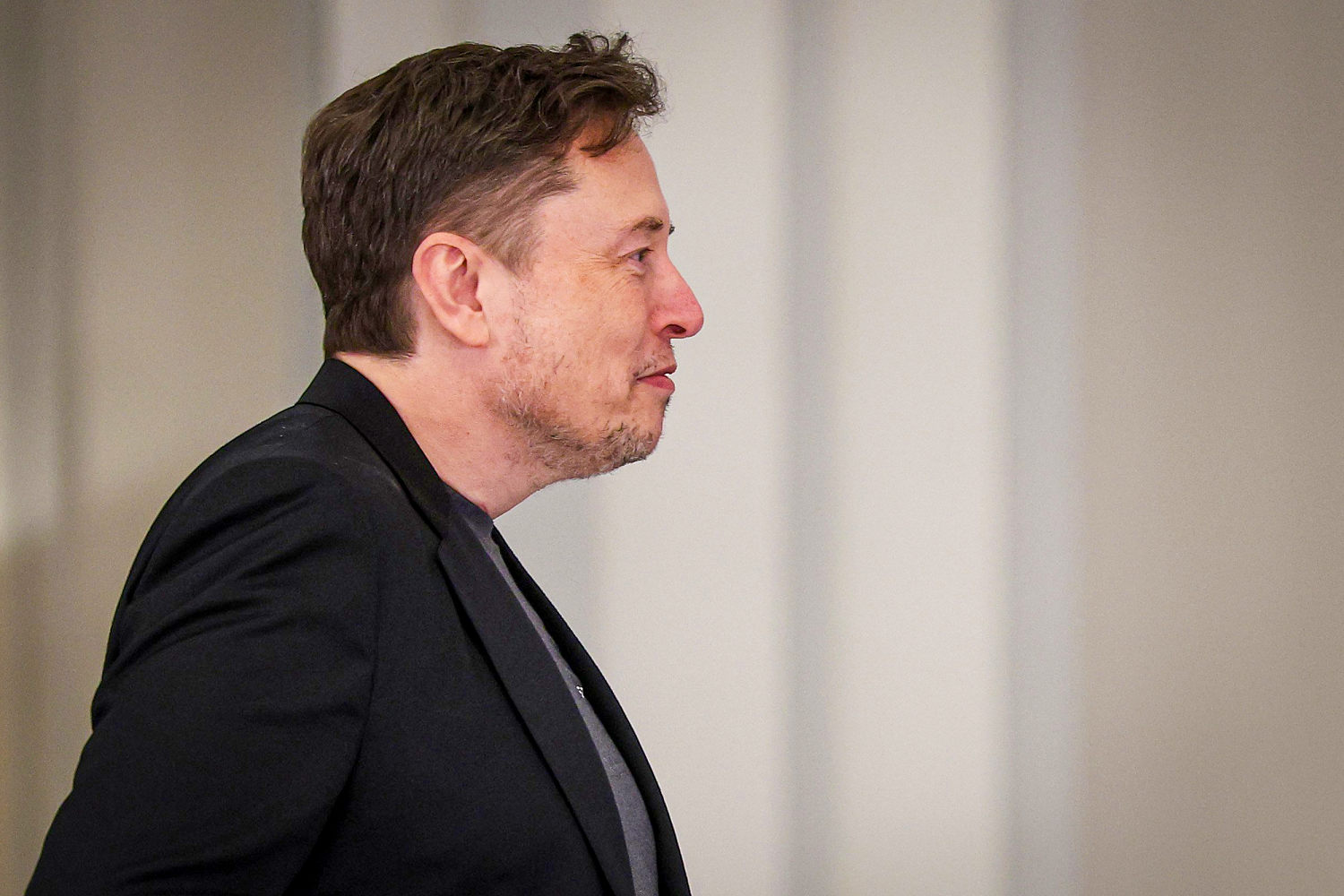

Welcome to the online version of From the Politics Desk, an evening newsletter that brings you the NBC News Politics team’s latest reporting and analysis from the White House, Capitol Hill and the campaign trail.
In today’s edition, we explore how Elon Musk is adding fuel to the fire for Republican skeptics of President Donald Trump’s “big, beautiful bill.” Plus, Andrea Mitchell dives into how Trump is fundamentally reshaping the the postwar alliance between the U.S. and Europe.
Sign up to receive this newsletter in your inbox every weekday here.
— Adam Wollner
Elon Musk emboldens GOP critics of Trump’s big bill
Elon Musk took some of the wind out of the sails of the “big, beautiful bill” as it moves to the Senate next week after passing the House by the narrowest of margins.
In an interview with CBS’ “Sunday Morning” that will air in full this Sunday, Musk said he was “disappointed” that the massive domestic policy package would increase the deficit and said it “undermines” the work of the Department of Government Efficiency.
“I think a bill can be big or it can be beautiful, I don’t know if it can be both,” Musk said.
It’s not the first time Musk has broken with President Donald Trump on a major issue. (See his comments on tariffs last month). Nor is it the first time Musk has thrown a wrench into the middle of high-stakes legislating on Capitol Hill. (See his comments on a government funding bill late last year.)
The criticism: Musk has suggested he’s scaling back from his administration role to return his attention to the private sector. But his comments still served to embolden conservative critics of the multitrillion-dollar package, as the GOP faces a tight timeline and little margin for error for final passage.
Rep. Warren Davison of Ohio, one of only two Republicans who voted against the bill in the House last week, said in response to Musk’s interview on X: “Hopefully, the Senate will succeed with the Big Beautiful Bill where the House missed the moment. Don’t hope someone else will cut deficits someday, know it has been done this Congress.”
Sens. Rand Paul of Kentucky, Ron Johnson of Wisconsin and Mike Lee of Utah reiterated their issues with the bill, which revolve around the deficit impact. The Congressional Budget Office has projected the legislation would add $2.3 trillion to the federal deficit over 10 years.
“This bill isn’t a done deal yet,” Lee said. “The Senate version will be more aggressive.”
Republicans can only afford three defections in the Senate, and any changes they make there would have to go back through the House before the bill can go to Trump’s desk, which they are aiming to do by July 4.
The defense: Trump’s allies quickly rushed to defend the package, which is a product of delicate negotiations among Republicans with a thin House majority.
White House deputy chief of staff Stephen Miller and House Speaker Mike Johnson, R-La., took to X to say that their efforts to shrink the size of government would extend beyond the “big, beautiful bill.” They said they would seek to cut spending through a rescission package — a clawback of money that Congress has already appropriated — and through the regular budget process for the 2026 fiscal year.
“The House is eager and ready to act on DOGE’s findings so we can deliver even more cuts to big government that President Trump wants and the American people demand,” Johnson said.
What Trump is saying: Asked about Musk’s criticism, Trump said he was “not happy about certain aspects” of the bill, but “thrilled by other aspects of it.”
Read more →
Town hall heat: GOP Reps. Mike Flood of Nebraska and Ashley Hinson of Iowa faced intense questioning and jeers at town halls this week over their support for the “big, beautiful bill.”
How Trump is reimagining the U.S.-European alliance
Analysis by Andrea Mitchell
Has the Trump administration decided America’s closest European allies should be treated as adversaries?
Setting aside President Donald Trump’s long-standing aversion to NATO and Defense Secretary Pete Hegseth calling the Europeans “pathetic” in a now-infamous Signal chat, now the State Department is sending diplomats to Ireland and France to chide their governments for allegedly censoring free speech by right-wing political parties and movements.
Secretary of State Marco Rubio went on social media to criticize Germany for labeling a far-right opposition party “extremist.” And Vice President JD Vance caused a furor at the Munich Security Conference by attacking his hosts for “a retreat of Europe from some of its most fundamental values — values shared with the United States of America.”
Vance’s criticism, immediately rejected by some Republicans in attendance, was widely written off as an outlier. Now it has become policy.
An even more inflammatory statement just published on the State Department’s official Substack is expanding on Vance’s critique and declaring U.S. support for the nascent right-wing movements across Europe. In a separate but related statement, Rubio announced visa restrictions against foreign nationals who try to censor Americans or foreign officials who demand that U.S. tech platforms moderate global content that reaches into the United States.
Leaders of the European Union, the world’s largest trading bloc, are also reeling from Trump’s recent suggestion that the U.S. would impose a 50% tariff on E.U. exports — a proposal he put on hold after a sharp rebuke from the markets pending the conclusion of trade negotiations in July. But with plans underway for the annual NATO summit in June, European leaders are also bracing for the latest Trump salvo over their lagging defense commitments, coupled with a potential declaration that he will not sustain U.S. military support for Ukraine once the current pipeline of Biden-approved weapons runs out.
As Europe scrambles to replace what it anticipates will be the U.S. abandonment of Ukraine, British Prime Minister Keir Starmer is leading the charge to rally European contributions — although they cannot duplicate American air defenses or intelligence. And Starmer is rushing to try to repair his country’s post-Brexit breach with the E.U. in expectation of an economic stalemate over tariffs with the White House. Meanwhile, the entire bloc looks toward Beijing as an alternative trading partner.
What isn’t clear is how the Trump administration’s criticism of Europe and tariff fights advance either U.S. security or economic interests. But this appears to be only the beginning of the administration’s reimagining of a postwar alliance that rebuilt a devastated Europe and created the greatest, most sustained economic boom in American history.
🗞️ Today’s top stories
- 📝 Pardon politics: Trump said he would look into possibly pardoning the men convicted in a scheme to kidnap Michigan Gov. Gretchen Whitmer. Read more →
- 📝 Pardon politics, cont.: Trump’s recent string of pardons highlight the Justice Department’s pullback from public corruption cases. Read more →
- ➡️ Russia-Ukraine latest: Trump suggested he’ll make a decision in the next two weeks on how he will deal with Russia’s handling of peace talks with Ukraine. Read more →
- 📈 Deportation data: The Trump administration has dramatically stepped up its pace of deportations, according to Immigration and Customs Enforcement data obtained by NBC News, but is still lagging behind its target. Read more →
- 🚫 New directive: The Trump administration has stopped scheduling new interviews for international students seeking visas to study in the U.S. as the State Department prepares for expanded social media screening of applicants. Read more →
- Follow live politics updates →
That’s all From the Politics Desk for now. Today’s newsletter was compiled by Adam Wollner.
If you have feedback — likes or dislikes — email us at politicsnewsletter@nbcuni.com
And if you’re a fan, please share with everyone and anyone. They can sign up here.
 Latest World Breaking News Online News Portal
Latest World Breaking News Online News Portal






